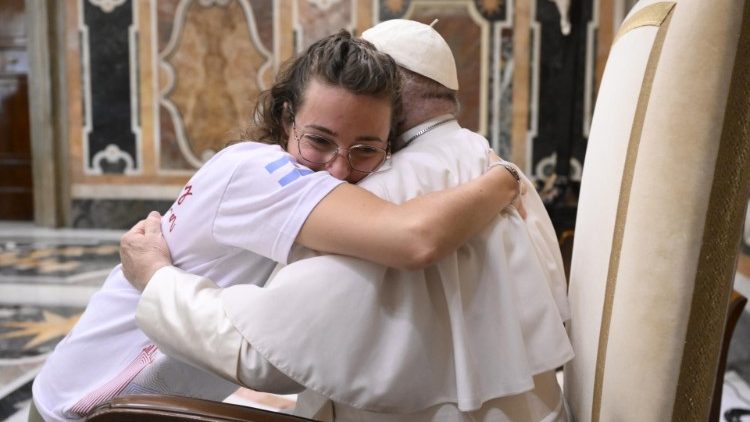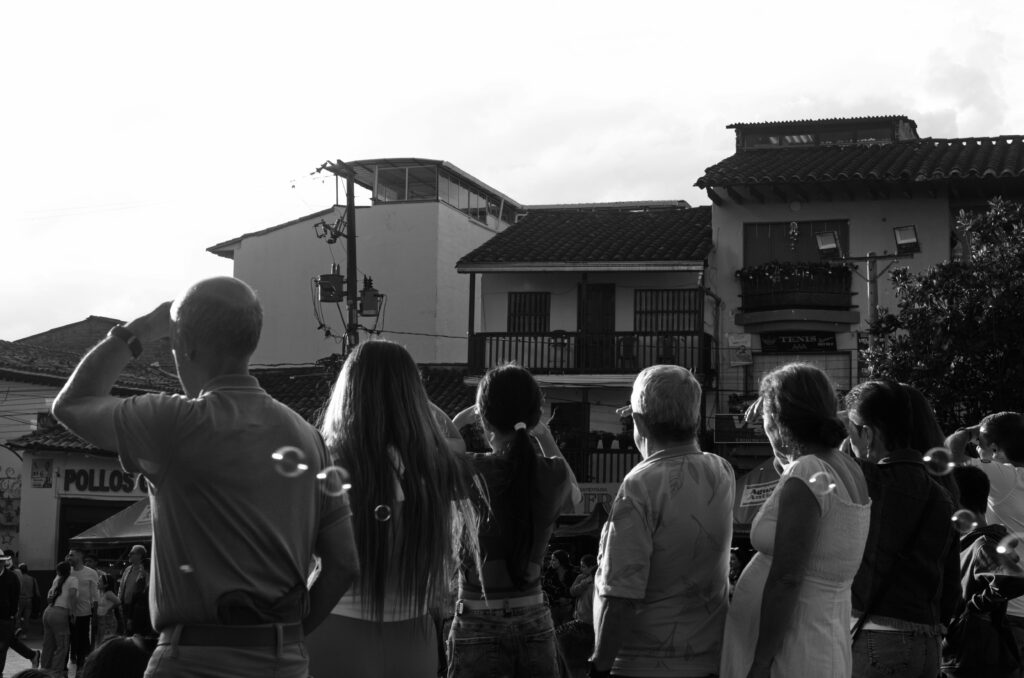“Dilexit Nos” Top Takeaways for Nonviolence and Just Peace
Pope Francis’ new encyclical picks up the moral framework of Fratelli tutti and declares love as the force to break cycles of violence and build peace

“All of us need to rediscover the importance of the heart,” (DN 2) Pope Francis asserts in his latest encyclical, published on Oct. 24. The new document delves into “the human and divine love of the heart of Jesus Christ” (DN 49) urging believers to deepen their devotion to the Sacred Heart of Jesus and, through it, to love those around them in both the church and the world.
Titled “Dilexit Nos” (“He Loved Us”), this letter carries a powerful message of compassion and love as the antidote to a world increasingly marred by violence, and division. Francis shows that, through the Sacred Heart, we are called to learn how to love one another and build a world rooted in justice and mercy.
The emphasis on the heart as the source of true transformation opens a door to more clearly recognize that love, grounded in the Sacred Heart of Jesus, can lead us to act in ways that respect and uphold human dignity in every interaction, aligning with a moral framework rooted in nonviolence. Francis once again turns our attention to dialogue and friendship (cfr. Fratelli tutti) as essential ways of engaging with others. He highlights that a heart-centered approach, one grounded in compassion and understanding, is critical to building authentic relationships—which are precisely the basis for nonviolent ways of being. This perspective emphasizes how relationships built on respect and empathy contribute to just peace, providing practical examples of how to engage constructively with differences rather than resort to divisiveness.
“Dilexit Nos” provides “the key” to understanding Francis’ other social encyclicals, according to Archbishop Bruno Forte of Chieti-Vasto, Italy, a noted theologian, during the Vatican’s press release of the document. Francis himself affirms this, writing, “The present document can help us see that the teaching of the social encyclicals ‘Laudato si’” and ‘Fratelli Tutti’ is not unrelated to our encounter with the love of Jesus Christ. For it is by drinking of that same love that we become capable of forging bonds of fraternity, of recognizing the dignity of each human being, and of working together to care for our common home.” (DN 217) This grounding in love—rooted in the Sacred Heart—offers a holistic, nonviolent approach to healing social fractures and addressing the world’s challenges.
Paving the Way for Nonviolence: from “Fratelli Tutti” to “Dilexit Nos”
In “Fratelli Tutti,” Pope Francis took a decisive step toward highlighting nonviolence and establishing a moral framework for just peace. Reflecting on the destructive nature of violent conflict and fear, Francis wrote that war constitutes an “affront to human dignity” (FT 25), the central, orienting theme of Catholic social teaching. Nonviolence, on the other hand, reverences human dignity and life.
Francis first drew attention to dialogue and friendship as essential, nonviolent ways of being, emphasizing the value of “processes of encounter… that build a people that can accept differences” (FT 217) rather than “the violence of those who despise differences.” (FT 218) Such encounters represent the first pillar of a just peace framework, focusing on the development of virtues and skills that promote constructive engagement with conflict.
To disrupt cycles of violence, Francis called for us to become artists and architects of peace, with forgiveness as a core spiritual discipline. He openly condemned the use of [violent] force to gain power over others” (DN 238). As a result, he asserts, “To be true followers of Jesus today also includes embracing his teaching about nonviolence” (Nonviolence: A Style of Politics for Peace, 2017).
In “Dilexit Nos,” Pope Francis continues and deepens this commitment to nonviolence and just peace, emphasizing the transformative role of love as the foundation for unity and conflict resolution. While “Fratelli Tutti” laid the groundwork for a nonviolent moral framework, this new letter brings the focus inward, calling believers to rediscover the power of the heart as the source of empathy, reconciliation, and true peace. Francis stresses that only through aligning our hearts with divine love can we hope to address the conflicts that fracture our communities and threaten global stability. This shift to the heart as the starting point of nonviolent action offers a practical and spiritual path for individuals and communities committed to peace.
One of the central messages of “Dilexit Nos” is the need for the heart to guide our actions, particularly in a world increasingly dominated by division, consumerism, and disregard for the dignity of others. Francis writes that “in a world where everything is bought and sold” (DN 218), love has the unique power to break through our fixation on materialism and self-interest, allowing us to connect meaningfully with others and view them with compassion rather than competition. This shift is essential for disrupting cycles of violence, as it counters the forces that dehumanize individuals and justify harm.
“Dilexit Nos” builds upon Fratelli Tutti’s call for “processes of encounter” (FT 217), now emphasizing that such encounters must be fueled by a heart-centered approach if they are to be authentic and effective. He argues that “the Church also needs that love, lest the love of Christ be replaced with outdated structures and concerns” (DN 219), warning that without genuine compassion and openness, institutions become rigid, focused on preserving power rather than serving people. This focus on the heart’s role in guiding relationships and institutions aligns with his vision for a just peace and the spirituality of nonviolence—a profound, personal commitment to honoring the humanity of others.
In “Dilexit Nos,” Francis also reinforces the concept of forgiveness as a radical (nonviolent) response to conflict. As “artists and architects of peace” (FT), we are called to place forgiveness as the foundation of a just (nonviolent) environment. Through forgiveness, individuals disrupt the chain of retribution and create space for healing, recognizing that “Jesus never promoted violence.” (FT 238) True discipleship, involves breaking free from the destructive cycle of revenge and embodying Christ’s teachings about the nonviolent practices of love and mercy .
With “Dilexit Nos,” the Holy Father thus completes a powerful progression from the broader social vision of “Fratelli Tutti“ to a personal, heart-centered practice of nonviolence. For Francis, the heart is where peace begins, and only through this deep, personal connection to love can humanity hope to achieve a nonviolent world that values dignity, unity, and life over division and destruction.
Five takeaways from “Dilexit Nos” and “Fratelli tutti” for nonviolence
In “Dilexit Nos” and “Fratelli Tutti,” Pope Francis is giving us more than just a set of teachings; he’s offering a powerful call to see love and compassion as the bedrock of how we engage with the world. But what does that really mean? How does this vision translate into something we can live out, especially when it comes to dealing with conflict or division? These two encyclicals take nonviolence beyond strategy and make it about honoring the dignity of every person—even those we might see as opponents. Here are five standout takeaways from Dilexit Nos and Fratelli Tutti that challenge us to think of nonviolence as something deeply personal, practical, and rooted in the heart.
The heart as the foundation for nonviolence
True peace begins with a transformation of the heart. Nonviolence stems from a commitment to align our thoughts and actions with love, letting the heart guide us toward unity and reconciliation. Only by centering our lives around compassion can we resist the destructive desires and aggressive impulses that fuel violent conflict.
Breaking cycles of violence through love
Francis speaks to the relentless cycle of violence, urging a shift away from retaliatory responses and toward a love that “breaks the cycle” of harm. Every act of violence, whether personal or societal, perpetuates a cycle of destruction. Nonviolence requires courageous love, the kind that chooses forgiveness and refuses to mirror aggression with more aggression.
Encounters and dialogue as pathways to just peace
Building just peace requires ongoing dialogue and encounters that foster understanding across divides. A “process of encounter” is central to creating a society where differences are respected and conflicts are resolved through mutual respect rather than violence. This commitment to dialogue represents a key strategy for engaging conflicts constructively within a just peace framework.
Empathy and forgiveness as bridges to human dignity
“Dilexit Nos” calls for empathy as the path to recognizing and honoring human dignity. Francis highlights how witnessing the suffering of others, including victims of war and refugees or those who are forcibly displaced, should awaken a compassionate response. He argues that true peace requires us to see the humanity in each person, fostering an empathy that actively resists violence and injustice, and practicing forgiveness as a radical, nonviolent response to conflict.
Nonviolence as integral to Christian discipleship
Pope Francis positions nonviolence not just as an option but as a core part of following Christ. He stresses that “Jesus never promoted violence,” reminding us that nonviolent love is central to the Gospel. This teaching underscores that true discipleship involves a commitment to peace, forgiveness, and active engagement in building a world free from the scourge of violence.
All in all, Pope Francis leaves us with a message of hope and challenge: “It is only by starting from the heart that our communities will succeed in uniting and reconciling differing minds and wills so that the Spirit can guide us in unity as brothers and sisters.” (DN 28) This is his invitation—a call to cultivate a world grounded in nonviolence, the love that transforms and unites.
Marie Dennis – Senior Director de Catholic Nonviolence Initiative

 (EN)
(EN)
 (ES)
(ES)
 (IT)
(IT)





